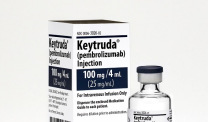FDA Approves Keytruda for Certain Mesothelioma Patients
Treatment & DoctorsWritten by Tim Povtak | Edited By Walter Pacheco

Patients with pleural mesothelioma cancer may have another treatment option after the U.S. Food and Drug Administration approved the use of pembrolizumab for certain metastatic tumors this week.
Pembrolizumab, often known by the brand name Keytruda, is a well-known immunotherapy drug already being used with mixed success for several cancers.
This latest FDA approval is for the treatment of adult and pediatric cancers with unresectable disease and high mutational burden that have progressed following prior treatment and have no alternative treatment options.
A number of mesothelioma patients already are being treated with pembrolizumab in clinical trials or under special access programs through manufacturer Merck & Co., the pharmaceutical giant.
Keytruda has been especially effective for some, but only for a small percentage of mesothelioma patients. Mesothelioma specialists have been finding varied success when using it in combination with other therapies.
“It can be used for mesothelioma, but it’s not the magic bullet,” Dr. Raja Flores, mesothelioma specialist at Mount Sinai Hospital in New York, told The Mesothelioma Center at Asbestos.com. “Its overall effectiveness is modest at best. Surgery remains the single most effective treatment for diminishing tumor volume.”

Gain access to top mesothelioma doctors and get help scheduling appointments.
Connect NowPrevious Keytruda Results Have Been Mixed
This week’s approval is based upon findings from an ongoing clinical trial exploring the use of pembrolizumab as a tumor inhibitor for patients expressing high levels of the protein PD-1, referred to by the FDA as tumor mutational burden-high, or TMB-H.
The KEYNOTE-158 clinical trial involved a variety of tumor types, including small-cell lung, thyroid, cervical, biliary, anal, salivary, endometrial and mesothelioma cancers.
It included 99 patients with TMB-H and 652 patients without high TMB. Mesothelioma was the most common cancer in the second group at 12.7%. Patients received 200 mg of intravenous pembrolizumab every three weeks.
The response rate to the drug was 29% for those with TMB-H, compared to just 6% of those patients with low tumor mutational burden.
This 2019 clinical trial reported a progression-free survival rate of 26.4% at one year in the TMB-H group and 14.1% in the non-TMB-H group. The two-year rates were 18.9% and 6.5%, respectively.
Adverse side effects were considered tolerable, but included decreased appetite, musculoskeletal pain, fatigue, nausea, rash, abdominal pain and cough.
A number of earlier studies have shown that less than 20% of mesothelioma patients express the high levels of the PD-1 protein that would make pembrolizumab effective for this rare and aggressive cancer. High PD-1 expression was found in 16% of mesothelioma patients in one earlier study from 2018.
Pembrolizumab failed to improve progression-free survival in mesothelioma patients overall when compared to standard chemotherapy in one clinical trial that published results in 2019. Progression-free survival for patients being treated with pembrolizumab was just 2.5 months, compared to 3.4 months with chemotherapy.
FDA Keytruda Approval Follows Tumor Treating Fields
The recent approval comes in the wake of the FDA’s approval in 2019 of Tumor Treating Fields for pleural mesothelioma. The therapy works through alternating electrical fields to limit cancer growth and is being used in combination with chemotherapy.
Tumor Treating Fields was the first approval for mesothelioma since 2004 when the FDA approved the use of pemetrexed (Alimta) in combination with cisplatin chemotherapy.
Pembrolizumab earned its first FDA approval in 2017 when used in combination with chemotherapy as a first-line treatment for metastatic non-small cell lung cancer. It also has been approved for certain types of head and neck cancers, bladder cancer and colorectal cancer.
“I believe the FDA made the right decision to approve pembrolizumab based on these findings. However much still needs to be learned,” said oncologist Dr. Marwan G. Fakih, City of Hope Cancer Center in California, who serves as principal investigator for the clinical trial. “The ability to accurately estimate the benefits from treatment within each of these tumor types is quite limited.”






